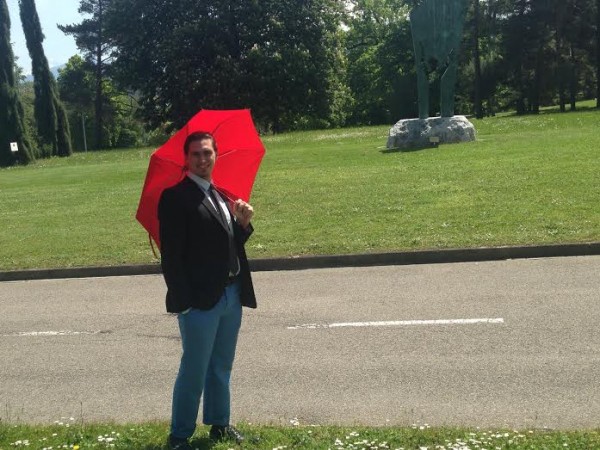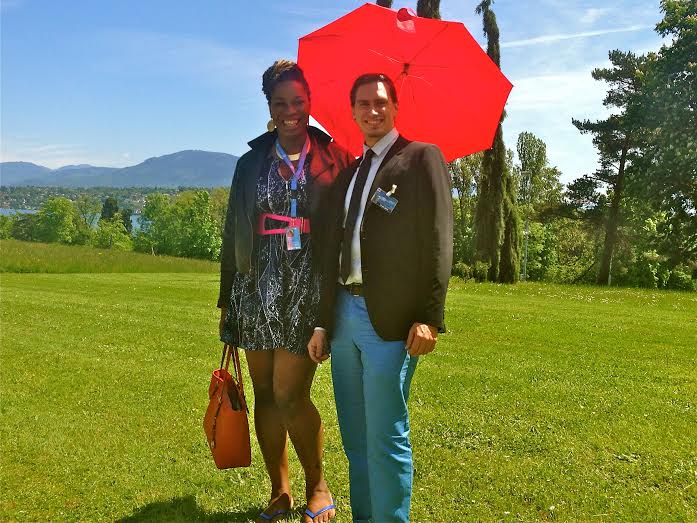
On May 11th, American sex workers’ rights activists Monica Jones and Derek Demeri met with the United Nations’ Human Rights Council in Geneva to advocate for protections for sex workers, in preparation for the Council’s quadrennial Universal Period Review of the US’ human rights record that same day. The following interview was conducted with Demeri, of the New Jersey Red Umbrella Alliance, via e-mail and edited for clarity and length.
What were your goals in making recommendations to the United Nations’ Human Rights Council? If the Council absorbed just one point from your presentation, what do you hope it was?
Ultimately, we want people in positions of power to hear and recognize the struggle that sex workers have been facing for centuries. Sex workers and their allies know all too well the violence that comes at the hands of the police and [those in] other positions of authority. We know how deep stigma runs in society when sex workers can face eviction from housing or termination from employment for past experience in the sex trade. We know how the government has completely failed to aid sex workers against the HIV epidemic that continues to sweep the country. Our community knows these things, but we need to let the world know.
Unfortunately, there were no specific recommendations that sought to protect sex workers during this UPR [Universal Periodic Review] round of the United States. There were several recommendations that encouraged the United States to do more to end human trafficking, which we of course know means more policing of our communities and public shaming for our work. However, Thailand made a recommendation to have “more holistic monitoring” and “evidence based” research when combating human trafficking, which we can use to support sex workers. Many countries also made recommendations regarding ending racial profiling, torture in the prison system, and ending police brutality, which are all important for our community.

Opposition to sex workers’ rights often reduces the issue to a “victimized women/evil client and evil pimp men” binary, without acknowledging the existence of male and genderfluid sex workers, and often denying trans women sex workers their womanhood. As the report that Best Practices Policy Project, Desiree Alliance, and SWOP-NYC presented to the Council in anticipation of your recommendations for its Universal Periodic Review stated, sex working trans women of color are especially targeted by police for arrest, human rights violation, and violence. What did you hope to convey to the Council about the needs of trans women sex workers and other sex workers on the trans spectrum, as well as male sex workers?
The ways in which “experts,” usually self-identified feminists, patronize other women for engaging in the sex trade never ceases to amaze me. Speaking with no experience on how the trade actually works, they would never admit to the existence of men in the sex trade, of female clients or of people who break the gender binary—doing so clearly contradicts all of their arguments. I think this really speaks to how problematic it is when academics try to make binaries [to discuss] societal issues—people are man or woman, black or white, gay or straight. Well, there are millions of people who fall between and outside these binaries, and reducing the sex trade to the male client/female worker binary only ignores the lives of thousands of people.
Many male sex workers face little to no harassment from police because of how invisible they are to the public. However, LGBTQ youth—particularly homeless LGBTQ youth of color—do face harassment by police based on anti-sex work laws. Since this population is assumed to be engaging in survival sex, police have been documented to use condoms as evidence during stop and frisk encounters. Of the homeless shelters that do exist for youth, many are homophobic and transphobic or enforce strict curfews that hinder youth sex workers from having a stable work schedule.
On average, trans women of color make less than $10,000 a year; and with so much employment discrimination that prevents them from gaining access to other jobs, many trans women of color resort to the sex trade. This leads police to profile all trans women of color as sex workers. Their existence, whether or not they are actually engaging in the sex trade, is always assumed to be breaking the law. Every time a trans woman of color is in a public space and she smiles as someone, waves at a car, or stands waiting—this is all proof in minds of the police that they are engaging in sex work. As long as anti-sex work laws exist, the police will continue to use these laws to justify harassment of trans women of color.
The report also details the problems youth sex workers—especially LGBTQ youth sex workers—face from service providers and the law. Can you tell us a bit more about that?
It is estimated that 40% of the homeless youth population is LGBTQ, many of whom have been kicked out of their home or run away due to family hostility for their sexual or gender identity. While on the streets, sex work ends up being a necessary means for survival. There are very few youth specific shelters and, of those that exist, many are known to discriminate against LGBTQ people. This can come in the form of refusing to investigate instances of homo/transphobia from peers, refusing to accommodate someone’s gender identity or sexual partners, or outright denying services based on religious beliefs. Currently, activists have been rallying around the Runaway Homeless Youth Act, which would for the first time include LGBTQ youth in national non-discrimination clauses. Additionally, many shelters may enforce strict rules about when someone is allowed to leave, preventing youth from working at night, or may deny services after someone’s status as a sex worker is revealed.
Police use anti-sex work laws to harass LGBTQ youth (most often LGBTQ youth of color who are profiled during stop and frisk encounters). If condoms are discovered, they are used as evidence of prostitution and will be either used as evidence for arrest, destroyed to “stop them from working,” or to continue general harassment. This has an awful impact on [the] sex worker and LGBTQ community’s right to health, and negatively affects the United States response to the (ongoing) HIV epidemic.

During a previous round of this review, the U.S. accepted Recommendation 86 from Uruguay to “…ensure access to public services paying attention to the special vulnerability of [sex] workers to violence and human rights abuses.” As the report states, “the U.S. government has taken only minimal steps towards implementation, while passing laws and pursuing policies that directly contradict this commitment, putting sex workers at heightened risk of violence and human rights abuses.” The fact that sex workers are part of the process of making recommendations to the United Nations Human Rights Council on the US is in itself historic. Still, what function can these recommendations serve given our country’s history of noncompliance with them?
The United States has accepted a past recommendation in favor of sex workers and things have only gotten worse—so what does this all really mean?
As grassroots organizers, we see these recommendations as one of a number of tools sex worker activists have to promote our rights. When we go back home to New Jersey or Arizona, it means we can cite these recommendations to local policy makers and say these are issues that have been brought before the United Nations, and the United States has publicly agreed with ending violence against sex workers. Say there are local activists who are pushing to have legal protections for sex workers to be able to come forward in cases of rape or violence and ensure that they will not be arrested based on working status. These activists can use this past recommendation to say, “Well, actually, yes, this is needed and the United States government has promised to do more to end violence against sex workers, so here is something that you can do.” We wouldn’t expect this to move people who cite religious beliefs or “tradition” as reasons to oppose sex work, but these are the kind of things that can win over pragmatic policy makers.
Even though we did not get a specific recommendation for sex workers like the last UPR round, there are several recommendations that we could be using to advocate for our rights. Ending torture in prisons, police brutality and profiling, or advocating for evidence-based human trafficking policies—these are all things sex workers can and should be rallying behind.
Some of the recommendations the sex workers’ rights organizations you represented made to the Council were aimed at eliminating the most egregious offenses against sex worker rights, such as condoms as evidence laws, “prostitution free zone” legislation, and prosecution as sex offenders. Others radically re-imagined our criminal justice system for the better, such as the recommendation to end the use of money for bail. Which recommendations do you think the Council was most open to hearing?
The current political climate around the world means harm-reduction methods are the most politically realistic goals that we can advocate for. This means advocating an end to the profiling of our communities, using condoms as evidence, reducing state-sponsored violence, etc. The Human Rights Council isn’t going to push the status quo too far; we must remember that council is made up of national governments around the world. Until there is a stronger global movement on the rights of sex workers, we are not going to see radical ideas presented.
This idea is best illustrated by the LGBTQ rights movement. While a decade ago, it was a radical idea to see a push in the United Nations to decriminalize same-sex relations, today these ideas are commonplace. In today’s political climate, enough countries have decriminalized sodomy and have adopted measures recognizing same-sex relationships that there’s enough global support to be advocating for these rights. If sex workers in the United States wish to continue using the potential of the United Nations, then this really speaks to our need to send our solidarity to sex workers globally.

One of the universal rights that the US denies sex workers through criminalization, stigma, and lack of harm reduction services is the right to adequate healthcare. Can you elaborate on this?
Article 25 of the Universal Declaration of Human Rights, which has been signed by the United States, states that “Everyone has the right to a standard of living adequate for the health and well-being of himself and of his family including…medical care and necessary social services…” Any sex worker can tell you that our right to health care is clearly being violated based on this language. How are sex workers supposed to protect themselves from HIV or other sexually transmitted infections if condoms are criminalized? How are sex workers supposed to get necessary medical check ups if medical providers openly discriminate based on someone’s working status? How can anyone even claim to know the medical needs of sex workers if no proper epidemiological study can be done on sex workers if the criminalization of our existence prevents an honest conversation with researchers?
The section in the report on sex workers’ right to be free from torture and other cruel and inhumane treatment is a haunting litany of police abuse, proof that incarceration is indeed violence. Police have raped, assaulted, threatened, and tortured sex workers, but reports of these abuses are almost never taken seriously. Now that media attention and radical action is focused against US police violence against people of color this year, do you think more of these complaints will finally be heeded?
Regrettably, the reality of whorephobia in our culture is [that people] never trust what a sex worker says because they are immoral and lawless beings. In New Jersey, a former sex worker from Atlantic City has been trying for years to get justice in her case of police brutality, but she has faced hostile opposition from both lawyers and other gatekeepers to justice despite documented evidence. While people are accepting the reality of police brutality more, the realities of sex workers are still silenced, ignored and falsified. But there is a small minority that sees beyond whorephobia; we need to find these potential allies and work towards addressing very serious cases of police brutality against sex workers like in the above case. Until we find these people, this highlights our need to be building allies and combating whorephobia in our culture.

The more the despised and oppressed stand up for their rights and demand them, the less the public dehumanizes them. History is our witness to this truth.
Whorephobia keeps Recommendation 86 from protecting sex workers as it should. But it is a start. A beautiful start. In my book, “Are They Bad Girls or Brilliant?”, I laud the Recommendation with zeal; it was presented to President Obama and accepted by him in 2011, during one of my updates of the book. It felt so good to be able to work that into my pages.
We shall overcome. It will just take time. We may not see it in our lifetime. But our grandchildren might.
Here’s an excerpt that encapsulates the future I dream of:
Irregardless of what pimps or abolitionists want, in the wake of establishing whore validation, exploitive pimping would vanish. Likewise, abolition would become a dusty relic. Examining the past record of abuses to whores would disturb, but would also be amusing. It would be like observing the banned right of husbands to “possess” (that means rape) their wives, or the old-fashioned outrage of chastity belts. To that end, whore schools could actually function as museums.
(Hey, Ma! Look at this! It says here it used to be men forced women to have sex with other men, for money, and the men kept all the money! And even the women who kept all the money were screwed, cause they weren’t allowed to do it!
Jeeeeeeesh!!! That musta SUCKED!!!)
: